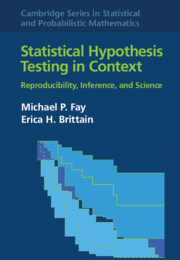Book contents
- Frontmatter
- Contents
- Preface
- 1 Introduction
- 2 Theory of Tests, p-Values, and Confidence Intervals
- 3 From Scientific Theory to Statistical Hypothesis Test
- 4 One-Sample Studies with Binary Responses
- 5 One-Sample Studies with Ordinal or Numeric Responses
- 6 Paired Data
- 7 Two-Sample Studies with Binary Responses
- 8 Assumptions and Hypothesis Tests
- 9 Two-Sample Studies with Ordinal or Numeric Responses
- 10 General Methods for Frequentist Inferences
- 11 k-Sample Studies and Trend Tests
- 12 Clustering and Stratification
- 13 Multiplicity in Testing
- 14 Testing from Models
- 15 Causality
- 16 Censoring
- 17 Missing Data
- 18 Group Sequential and Related Adaptive Methods
- 19 Testing Fit, Equivalence, and Noninferiority
- 20 Power and Sample Size
- 21 Bayesian Hypothesis Testing
- References
- Notation Index
- Concept Index
20 - Power and Sample Size
Published online by Cambridge University Press: 17 April 2022
- Frontmatter
- Contents
- Preface
- 1 Introduction
- 2 Theory of Tests, p-Values, and Confidence Intervals
- 3 From Scientific Theory to Statistical Hypothesis Test
- 4 One-Sample Studies with Binary Responses
- 5 One-Sample Studies with Ordinal or Numeric Responses
- 6 Paired Data
- 7 Two-Sample Studies with Binary Responses
- 8 Assumptions and Hypothesis Tests
- 9 Two-Sample Studies with Ordinal or Numeric Responses
- 10 General Methods for Frequentist Inferences
- 11 k-Sample Studies and Trend Tests
- 12 Clustering and Stratification
- 13 Multiplicity in Testing
- 14 Testing from Models
- 15 Causality
- 16 Censoring
- 17 Missing Data
- 18 Group Sequential and Related Adaptive Methods
- 19 Testing Fit, Equivalence, and Noninferiority
- 20 Power and Sample Size
- 21 Bayesian Hypothesis Testing
- References
- Notation Index
- Concept Index
Summary
This chapter handles power and sample size estimation used for study design. A very flexible method to estimate power is to simulate. Binomial confidence intervals can be used on the simulated power estimates to determine the number of simulations needed for the precision desired. To determine sample size by simulation, we introduce an algorithm based on methods for dose finding studies, that does not need a large number of replications at each different sample size tried. We present a general normal theory approximation, to give approximate sample sizes for designs that use simple tests such as the two-sample t-test, and the two-sample difference in binomial proportions test. We generalize to cases with unequal allocation between arms, or more complicated tests such as the logrank test. We discuss modifications to sample sizes for nonadherence or missing data.
Information
- Type
- Chapter
- Information
- Statistical Hypothesis Testing in ContextReproducibility, Inference, and Science, pp. 377 - 388Publisher: Cambridge University PressPrint publication year: 2022
